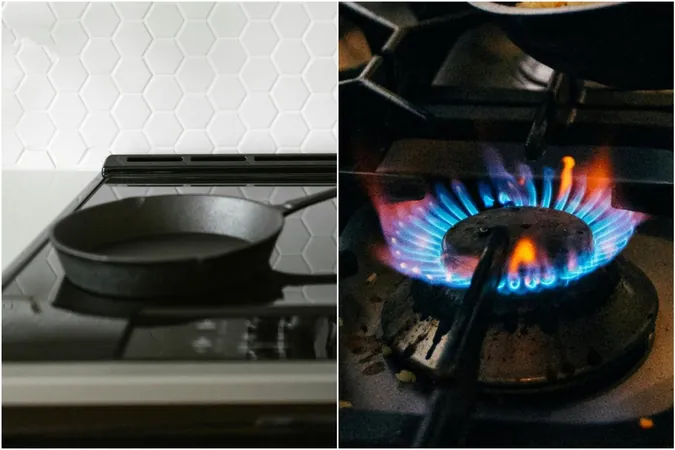
The Great Cooking Debate: Induction vs. Gas Hobs – What’s Best for Your Kitchen?
2024-12-20
Author: Ming
Introduction
SINGAPORE – As homeowners design their dream kitchens, one burning question is capturing attention: Should you go for a gas stove or an induction hob?
For years, gas burners were the undisputed kings of the kitchen, known for their quick heating capabilities, cost-effectiveness, and reliability. However, growing concerns about sustainability and health are igniting a heated debate over whether it’s time to transition to induction hobs.
International Perspectives
A significant step in this debate can be seen across the globe, with the Oxford City Council in Britain planning to ban gas hobs and boilers in new homes beginning in 2025, aiming for net-zero carbon construction within the same timeframe. On the contrary, a similar initiative in Victoria, Australia, faced fierce public backlash, prompting the government to scrap its plan to eliminate gas stoves in new builds, citing concerns about electric grid reliability and costs.
The Singapore Context
In Singapore, the dialogue around gas versus induction is also intensifying, as the push for sustainability and efficient urban living continues to grow. According to a June 2024 report by the Energy Market Authority (EMA), induction stoves are slowly gaining popularity due to their energy efficiency, safety, and environmental benefits.
Cultural Considerations
However, the cultural context is crucial. Asian culinary traditions, especially in bustling cities like Singapore, heavily rely on high-heat cooking techniques that often necessitate the use of gas. Traditional dishes that achieve distinctive flavors, like “wok hei,” which captures a smoky essence in stir-fries, pose unique challenges for induction cookers.
Expert Opinions
Dr. Rob Jackson, chair of the Global Carbon Project and a professor at Stanford University, asserts that induction stoves correctly take the crown for environmental superiority. Unlike gas stoves, they emit no harmful pollutants like nitrogen dioxide or carbon monoxide, which are known to contribute to serious indoor air quality issues.
Furthermore, Professor Rajasekhar Balasubramanian from the National University of Singapore adds that induction stoves boast an impressive 80% energy efficiency, while gas stoves waste significant energy into the atmosphere.
Performance in Cooking
But can high-power induction cookers meet the demands of traditional Asian cooking? Chef K.K. Kong, executive chef at Sentosa Golf Club, states that while induction stoves can effectively prepare various Asian dishes, achieving the characteristic flavors of gas-cooked meals remains a struggle. “Induction can get close to it, but it lacks that signature taste,” he explains.
Cost Considerations
When it comes to cost, induction stoves may have a higher initial investment, often requiring special cookware. However, their long-term savings on energy bills can be significant, potentially saving households an estimated $103 per year according to the National Environment Agency. Installation costs for gas stoves typically range from $200 to $1,000, while induction options can soar from $500 to a staggering $5,000, depending on the model chosen.
Health and Safety
Safety and health are paramount concerns for residents in high-density urban environments. Dr. Jackson warns that gas stoves can emit harmful pollutants that can accumulate indoors, adversely affecting overall air quality. In contrast, the zero-emission nature of induction cookers makes them a healthier choice for urban living.
Barriers to Adoption
Despite the advantages of induction, there are barriers to widespread adoption, especially in older homes, which may require costly electrical upgrades. Prof. Balasubramanian mentions that while the upfront cost is steeper, the long-term savings in utility bills will make the switch worthwhile over time.
Looking Ahead
Looking ahead, Singapore’s sustainability objectives may play a significant role in shaping culinary practices. While increasing reliance on induction stoves could strain the electrical grid, suggestions to incorporate more renewable energy into the power mix could mitigate this impact.
Conclusion
Ultimately, the choice between a gas burner and an induction hob in your kitchen reflects much more than just personal taste; it touches on sustainability, health, and the evolution of cooking traditions.
Call to Action
So, which side are you on? Are you Team Gas, reveling in traditional flavors, or Team Induction, committed to efficiency and health? The decision is yours to make, and it could shape the future of cooking!


 Brasil (PT)
Brasil (PT)
 Canada (EN)
Canada (EN)
 Chile (ES)
Chile (ES)
 España (ES)
España (ES)
 France (FR)
France (FR)
 Hong Kong (EN)
Hong Kong (EN)
 Italia (IT)
Italia (IT)
 日本 (JA)
日本 (JA)
 Magyarország (HU)
Magyarország (HU)
 Norge (NO)
Norge (NO)
 Polska (PL)
Polska (PL)
 Schweiz (DE)
Schweiz (DE)
 Singapore (EN)
Singapore (EN)
 Sverige (SV)
Sverige (SV)
 Suomi (FI)
Suomi (FI)
 Türkiye (TR)
Türkiye (TR)